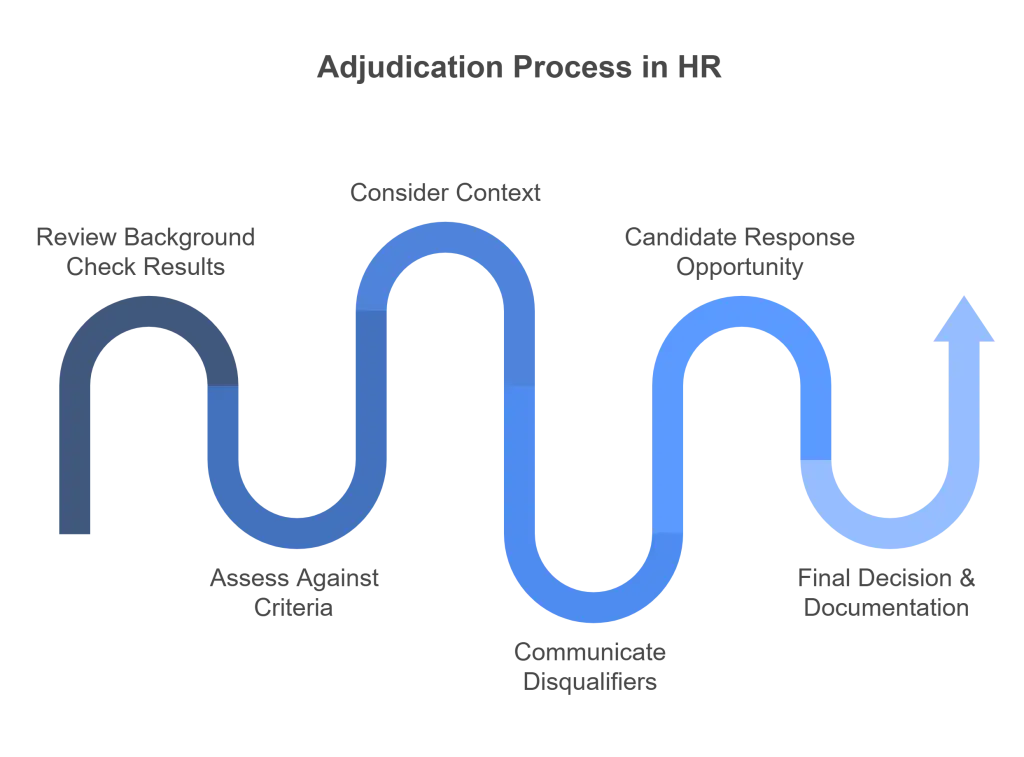Adjudication is a critical step in the hiring process where HR professionals evaluate the results of background checks to determine a candidate's suitability for employment. This process ensures that hiring decisions are fair, compliant with legal standards, and aligned with the company's risk management strategies.
Key Takeaways
- Adjudication in background checks is the process of reviewing results to determine if a candidate meets hiring criteria.
- It involves comparing background check findings against the employer's hiring standards.
- The adjudication process helps ensure fair and consistent hiring decisions.
- Employers may use automated systems or manual review to adjudicate background checks.
- Proper adjudication protects companies from potential legal issues and ensures compliance with regulations.
What does adjudication mean?
In the context of background checks, adjudication refers to the process of making a judgment or decision about a candidate's eligibility for employment based on the information gathered during the screening process. It's akin to a judge weighing evidence in a courtroom, but instead of determining guilt or innocence, HR professionals are assessing whether a candidate meets the company's hiring criteria.
Adjudication involves carefully analyzing all aspects of a background check, including criminal records, employment history, education verification, and any other relevant information. The goal is to make an informed decision that balances the company's needs with fairness to the candidate.
Think of adjudication as the final piece of a complex puzzle. Each element of the background check provides a piece, and through adjudication, HR professionals assemble these pieces to form a complete picture of the candidate's suitability for the role.
EXPERT INSIGHT: Adjudication holds an important role in placing the right candidate for the right position. What we often see in the candidate's resume tells a deeper story. Each piece of the background check puzzle offers a unique insight, and it’s our responsibility as HR professionals to assess it all with care and transparency. At its core, adjudication isn’t just about screening out the wrong fit; it’s about creating a more just and inclusive hiring process for everyone. - Charm Paz, CHRP
Understanding Adjudication
In employment, adjudication involves a thorough review of the data collected during a background check, which may include criminal records, employment history, and education verification. The objective is to assess whether any issues identified are significant enough to affect the candidate's eligibility for the job. This requires a balanced approach that considers both the company's requirements and the candidate's rights.
Adjudication must be conducted in compliance with laws such as the Fair Credit Reporting Act (FCRA), which regulates the use of background check information to ensure fairness. Additionally, HR professionals must adhere to guidelines from the Equal Employment Opportunity Commission (EEOC) and consider local "Ban the Box" laws, which aim to prevent discrimination and promote fair hiring practices.
Steps in the Adjudication Process

Review of Background Check Results
HR professionals meticulously examine the findings from background checks, including any criminal convictions or discrepancies in employment history. This step is crucial for identifying potential red flags.
Assessment Against Predefined Criteria
Each aspect of the background check is evaluated against the company's established criteria, which are often dictated by the job's nature and industry regulations. For example, a financial position may require a clean credit history.
Individualized Consideration of Context
A fair adjudication process involves considering the context of any issues found, such as the severity of an offense or its relevance to the job role. This approach ensures decisions are equitable and legally compliant.
Communication of Potential Disqualifiers
Before making a final decision, HR must communicate any potential disqualifiers to the candidate, usually through pre-adverse and adverse action notices as required by the FCRA. This transparency allows candidates to address inaccuracies or provide additional context.
Candidate Opportunity to Respond
Candidates should be given the chance to respond to the findings, which may involve clarifying discrepancies or disputing incorrect information. This step is vital for maintaining fairness and open communication.
Final Decision & Documentation
The final hiring decision is made based on all gathered information, with detailed documentation of the decision-making process. This ensures compliance and provides a defense if the decision is legally challenged.
Legal Considerations
FCRA Compliance
The Fair Credit Reporting Act emphasizes the accuracy and privacy of background check information. HR professionals must be well-versed in these standards to avoid legal issues.
EEOC Guidelines
The EEOC provides guidance to prevent background checks from disproportionately excluding certain groups, which could lead to discrimination claims.
State and Local "Ban the Box" Laws
These laws affect how and when background checks can be conducted, requiring employers to delay these checks until later in the hiring process.
Common Challenges
Incomplete or Ambiguous Records
HR professionals may encounter incomplete background check results, requiring additional verification from previous employers or educational institutions.
Balancing Risk vs. Second Chances
Deciding whether to hire a candidate with a criminal record involves weighing the risks against the potential benefits of offering a second chance.
Consistency in Adjudication
Establishing clear guidelines and training HR staff ensures uniformity in adjudication decisions, protecting the company from discrimination claims.
Conclusion
Adjudication is a cornerstone of effective HR practices, ensuring that hiring decisions are fair, compliant, and beneficial for both the company and candidates. By understanding and implementing a robust adjudication process, HR professionals can make informed, legally defensible hiring decisions.

GCheck Editorial Team
Meet the GCheck Editorial Team, your trusted source for insightful and up-to-date information in the world of employment background checks. Committed to delivering the latest trends, best practices, and industry insights, our team is dedicated to keeping you informed.
With a passion for ensuring accuracy, compliance, and efficiency in background screening, we are your go-to experts in the field. Stay tuned for our comprehensive articles, guides, and analysis, designed to empower businesses and individuals with the knowledge they need to make informed decisions.
At GCheck, we're here to guide you through the complexities of background checks, every step of the way.






